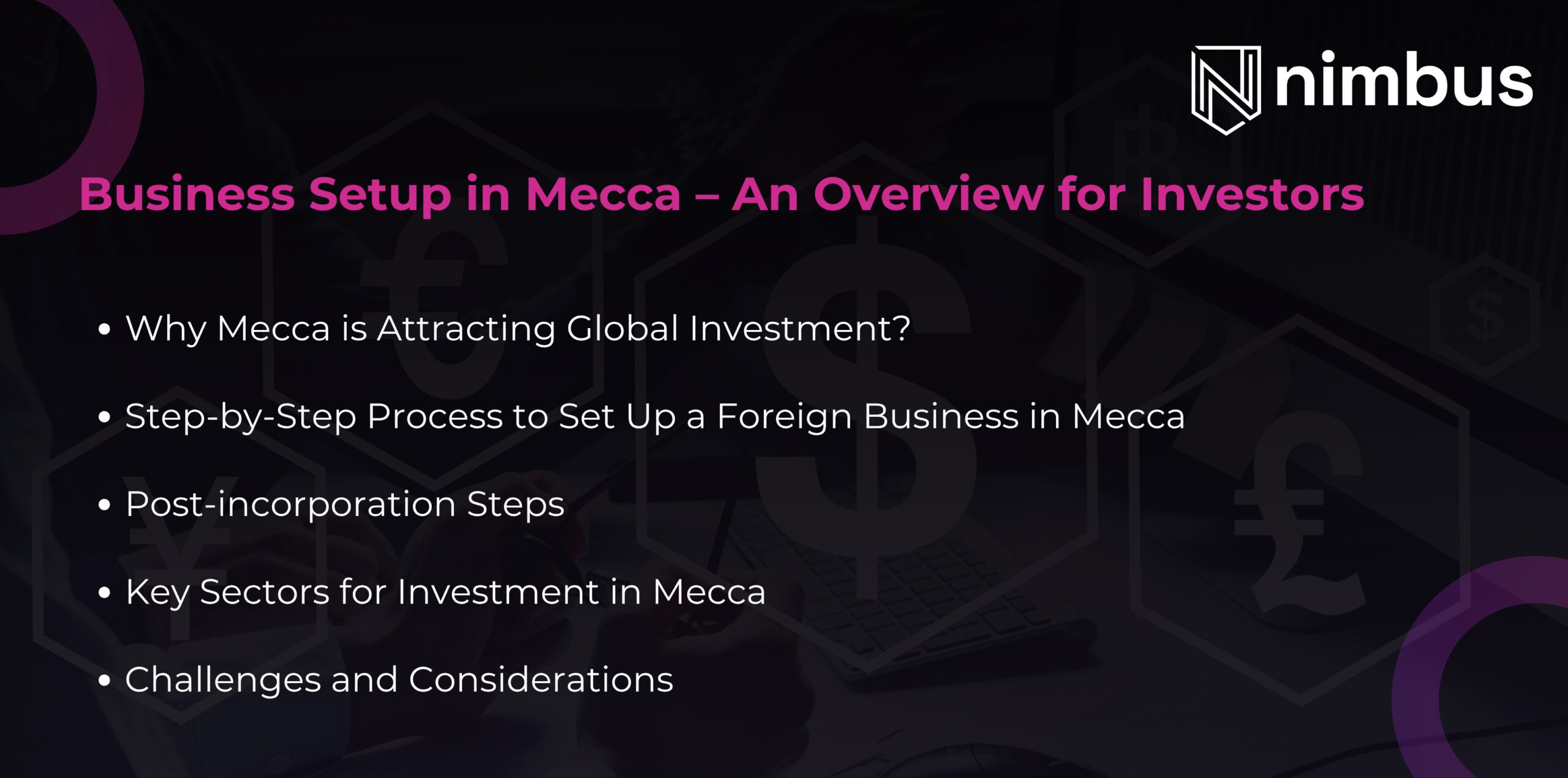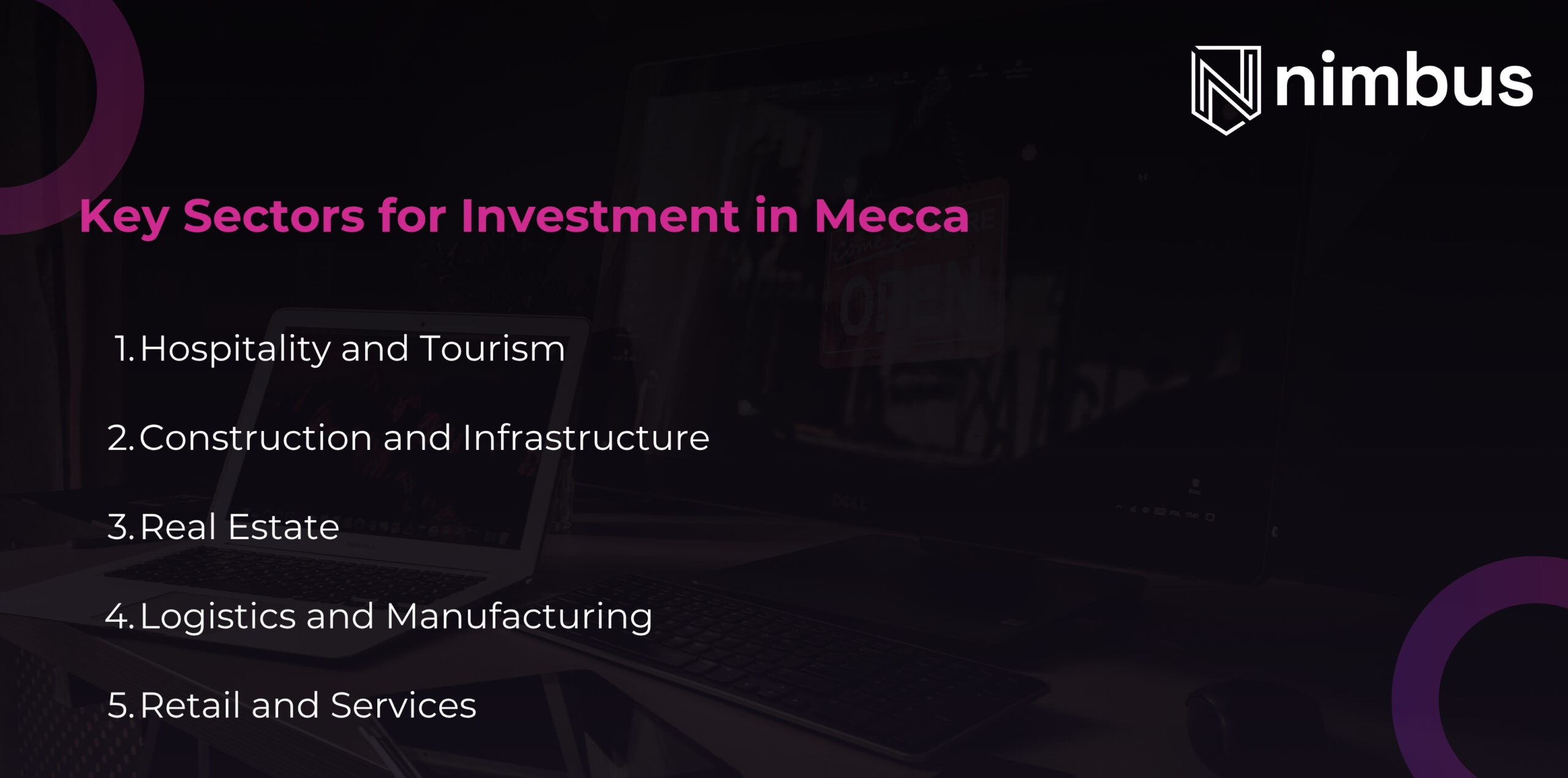Setting up a business in Mecca offers more than just access to one of Saudi Arabia’s most historic cities. With its strategic location, population growth, and major infrastructure projects like the Masar mega-development, Mecca is fast becoming a hub for hospitality, construction, and real estate investments.
Setting up a business in Mecca offers more than just access to one of Saudi Arabia’s most historic cities. With its strategic location, population growth, and major infrastructure projects like the Masar mega-development, Mecca is fast becoming a hub for hospitality, construction, and real estate investments.
Business Setup in Mecca – An Overview for Investors

– Why Mecca is Attracting Global Investment?
Mecca is the second largest contributor to Saudi Arabia’s GDP, representing around 21 percent of the national economy. With more than 8 million residents and over 13.5 million annual Umrah visitors, Mecca is undergoing rapid transformation.
The Masar project alone is expected to inject over $26 billion in investments, build more than 24,000 hotel rooms and 13,000 residential units, and create upwards of 16,000 jobs. In 2024, hospitality licenses in the city grew by 80 percent, reflecting soaring demand for quality infrastructure and services.
The Masar project alone is expected to inject over $26 billion in investments, build more than 24,000 hotel rooms and 13,000 residential units, and create upwards of 16,000 jobs. In 2024, hospitality licenses in the city grew by 80 percent, reflecting soaring demand for quality infrastructure and services.
– Step-by-Step Process to Set Up a Foreign Business in Mecca
For foreign investors, company formation in Mecca involves a three-phase process that typically spans around six months.
Phase #1: Establishing the Legal Entity
Obtain a MISA Investor License from the Ministry of Investment of Saudi Arabia.
2. Reserve a unique company name.
3. Draft and notarize the local Articles of Association (AoA).
4. Secure the Commercial Registration (CR) from the Ministry of Commerce.
5. Register with the local Chamber of Commerce.
Phase #2: Operational Authorization and Team Formation
6. Obtain the company seal.
7. Register with the Ministry of Labor to onboard employees.
8. Register with the General Organization for Social Insurance (GOSI).
9. Register your official national address with Saudi Post.
10. Apply for a General Manager (GM) visa.
11. Complete registration with the General Authority of Zakat and Tax (GAZT) and submit for VAT registration.
Phase #3: Finalize Residency and Banking Setup
12. Activate your Chamber of Commerce account for official correspondence.
13. Obtain mandatory health insurance for the GM.
14. Conduct the required medical check-up for Iqama processing.
15. Complete the issuance of the GM’s residency permit (Iqama).
16. Register with the Muqeem portal to manage visas and employee residencies.
17. Register with the Absher portal to access e-government services.
18. Register with the Qiwa portal for labor management and Saudization.
19. Register with the Mudad portal for compliance and wage protection.
20. Open a corporate bank account with a local financial institution.
– Post-incorporation Steps
Once the business is operational, the focus shifts to maintaining ongoing compliance. This includes:
· Adhering to Saudization targets through the Nitaqat system.
· Keeping employee and financial records updated across all government platforms.
· Renewing the GM’s Iqama and business licenses annually.
· Filing accurate tax returns and maintaining audit records.
Staying compliant in the post-setup phase requires both vigilance and experience. This is where support from specialized corporate advisory firms like Nimbus Consultancy becomes essential.
– Key Sectors for Investment in Mecca
Several sectors are showing strong potential for foreign investment:

1. Hospitality and Tourism: With over 30 million pilgrims expected by 2030, there is ongoing demand for hotels, restaurants, and support services.
2. Construction and Infrastructure: Projects like Masar and King Abdullah Economic City (KAEC) are driving consistent demand.
3. Real Estate: New ownership laws have opened this space to international investors.
4. Logistics and Manufacturing: KAEC’s industrial valley already hosts over 215 foreign companies.
5. Retail and Services: With a growing local population and increasing visitor footfall, the retail landscape is expanding rapidly.
– Challenges and Considerations
Setting up in Mecca comes with its own set of unique challenges, mainly including:
· Navigating bureaucratic processes can be time-intensive.
· Understanding Saudization and labor laws is crucial.
· Managing multilingual, multicultural teams requires strong HR systems.
· Changes in regulatory policies can impact timelines or costs.
However, the Saudi government has introduced several measures to streamline the process. Platforms like Qiwa, Absher, and Mudad have simplified labor and compliance management. Special Economic Zones (SEZs) also offer tax breaks and business-friendly environments.
Business Setup in Saudi Arabia

Mecca is at the forefront of Saudi Arabia’s economic transformation. With large-scale infrastructure projects, a rapidly growing population, and strong government support for foreign investors, now is the right time to establish a business in this region.
Whether you’re in hospitality, logistics, or tech, the opportunity to participate in Mecca’s growth is here. Partnering with expert consultancy firms like Nimbus Consultancy ensures that your business enters the market efficiently and remains compliant long-term.


